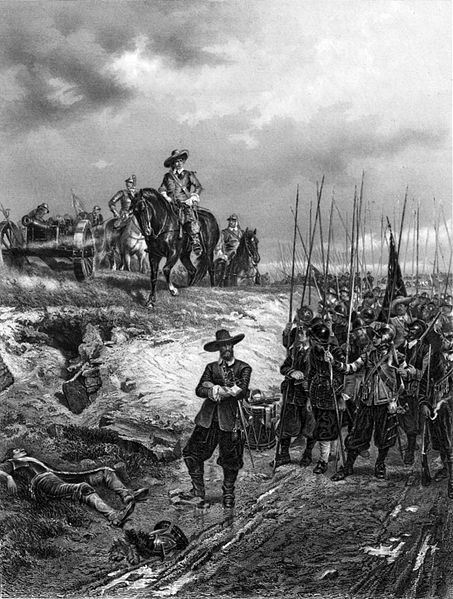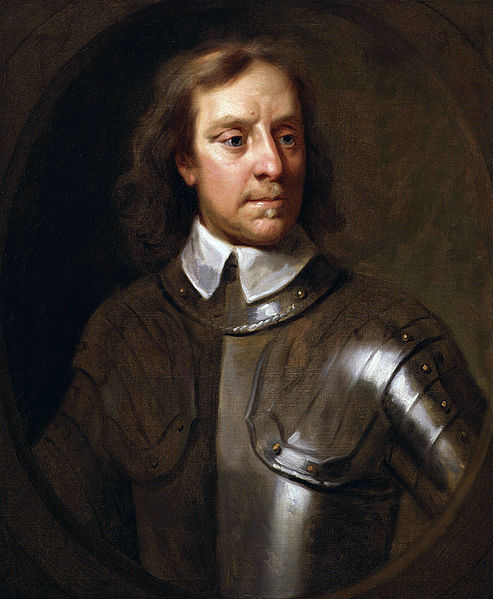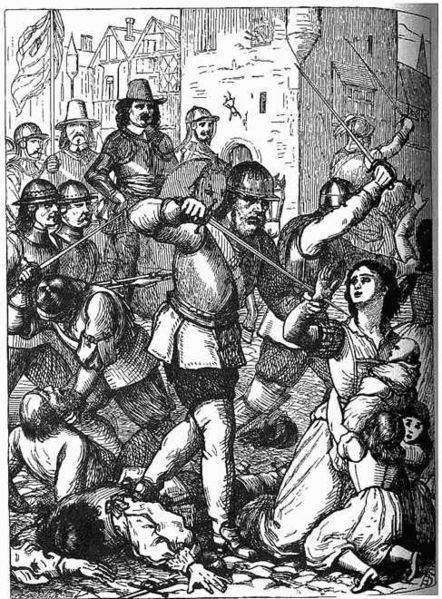peashooter85:A man who could make Hitler gasp —Oliver Cromwell and the conquest of Ireland.Tod
peashooter85:A man who could make Hitler gasp —Oliver Cromwell and the conquest of Ireland.Today Adolf Hitler is known as one of the most bloodthirsty tyrants and conquerors in history, unleashing an era of bloodshed and genocide upon Europe. Worst hit were the nations of Eastern Europe, especially Poland and the Soviet Union. Since Eastern Europe was considered “living space” for Hitler’s new Third Reich, the treatment of Slavic peoples can best be described as barbaric as the Nazi’s swept through the land, murdering innocent civilians, causing famine, and deporting unwanted peoples. However, over 400 years before Hitler was born another man conducted a similar campaign in Ireland that would easily rival if not surpass the brutality of Hitler.In the mid 1600’s England was in the throes of a civil war between the Puritans in Parliament and the Royalists loyal to the king. The commander of the Parliamentarian Army was Oliver Cromwell, a staunch Puritan who whipped his army into a ruthless fighting force of well armed, well organized religious fanatics. After Cromwell defeated the Royalist forces in England and overthrew King Charles I, he was named Lord Protector, an office which held the powers of a military dictator. In the meantime in Ireland, Irish Catholics rebelled against their English masters, using the weakness of England as an opportunity to overthrow the English yoke. The revolt grew bloody when around 5,000 - 8,000 English Protestants were murdered by Irish Rebels. English propaganda hyped the massacres claiming that up to 100,000 had been murdered, and depicted false atrocities such as women and children being roasted alive on a spit, then dismembered and eaten. Such propaganda further aroused the hatred of the Irish and many called for brutal revenge against Ireland.By the time Cromwell had become Lord Protector of England, Ireland had formed into a independent state called the Irish Confederation, a union of Irish Catholics, Scottish Covenantors, and English Royalists. Cromwell called for war against Ireland to regain control of the island. There were political reasons for such an invasion; the war was needed to maintain the tenuous alliance between Parliament and the army. The other reason was personal; Cromwell, and the people of England wanted revenge for the atrocities of the Irish Rebellion. In 1649 Cromwell invaded Ireland with an army of 12,000 men complete with several pieces of siege artillery. At first Cromwell gave orders that the Irish should be treated well, even hanging men caught looting. However, as Cromwell’s army was met with stiffer and stiffer resistance, Cromwell turned a blind eye to English atrocities. At the sack of Duncannon Parliamentarian troops murdered around 3,500 people both soldiers and civilians. Similar atrocities occurred at the cities of Wexford and Waterford.At the Siege of Drogheda, the Parliamentarian Army met especially heavy resistance. When the army stormed the city, Cromwell gave the order to put the city to the sword, killing men, women, and children indiscriminately until the city surrendered. After the siege Cromwell ordered the prisoners to undergo the ancient Roman ritual of decimation, which Cromwell himself noted in his dispatches, “”When they submitted, their officers were knocked on the head, and every tenth man of the soldiers killed and the rest shipped to Barbados.” Cromwell’s campaign of murder and destruction would continue for a year, with more and more atrocities against prisoners and civilians. Plague and famine also followed the Parliamentarian Army as it marched across the island, causing the death of 200,000 people, more than any combat deaths during the war. In 1650 Cromwell returned to England to put down a rebellion of Scottish Royalists. Cromwell left his son in law, Henry Ireton, in charge of the army. Ireton continued the campaign against Ireland, completing Cromwell’s conquests and destroying the Irish Confederation. The Irish officially surrendered in 1651. By then the population of Ireland had been reduced by 15%-25%.The Irish surrender, however, did not mean that the Irish rebels had given up. When the official war in Ireland ended, the unofficial war began. Many formed small bands in the Irish countryside, waging a relentless guerrilla war against the Parliamentarians. These rebels were often supported by the Irish civilian populace, who were not going to accept English rule even after the collapse of the Confederation. While Cromwell’s army was a well organized fighting force, it could not counter the tactics of the Irish guerrilla’s. To defeat the rebels Cromwell sought to destroy their main form of support, the Irish people. In 1651 Parliamentarians scoured the Irish countryside, burning crops, killing livestock, and destroying farms as to deny the rebels their main source of food. The result was a devastating famine that caused tens of thousands to die of starvation. Cromwell also designated entire county’s as free fire zones, in which anyone found could be, “taken slain and destroyed as enemies and their cattle and goods shall be taken or spoiled as the goods of enemies”. Parliament also passed laws to further increase the deprivations of the Irish people; laws transferring Irish land to the ownership of English nobles, laws which forbid Irish Catholics from owning land, and laws which forbid Irish from working government jobs. Catholicism was banned, and Catholic priests were either executed or sent into exile. Irish were even banned from living in certain towns and cities, and English colonization was encouraged, especially in Northern Ireland. The brutal iron handed tactics of Cromwell took its toll on Ireland, and by 1653 most Irish guerrillas had surrendered. The last large band of rebels gave up in 1658. By then around 600,000 Irish had died due to combat, disease, or famine. The vast majority had died of disease and famine caused by Cromwell’s war. 58,000 had been deported to the Caribbean to work as indentured servants in the sugar cane fields.During World War II the two nations which suffered the most under the Nazi’s was the Soviet Union and Poland. The Soviet Union suffered a population reduction of around 14% while Poland suffered a population reduction of 20%. Under the tyranny of Cromwell the Irish population decreased by 40%. Cromwell died in 1658 and the Parliamentarian government he built died with him as well. By then Cromwell was a hated man, despised by both Irish and English alike. In 1661 Cromwell’s corpse was exhumed from Westminster Abby and “posthumously executed”. His body would hang from a pole outside Westminster Hall until 1685.Today the Oliver Cromwell is viewed as one of the most important Englishman of all time. In Ireland, however, he is still viewed as a genocidal tyrant. In fact a common insult grew out of Cromwell’s treatment of Ireland, “May the curse of Cromwell be upon you!” While many of the Cromwellian Laws against Ireland were relaxed after his death, the English, and later British continued to rule over Ireland until its independence in 1922. -- source link
Tumblr Blog : peashooter85.tumblr.com
#history#oliver cromwell#ireland#war#massacre#genocide#atrocities#famine#disease#conquest


